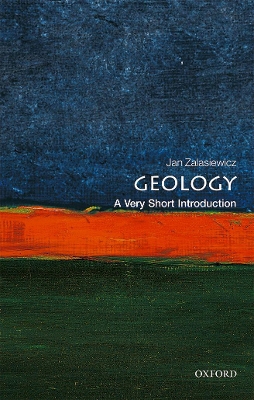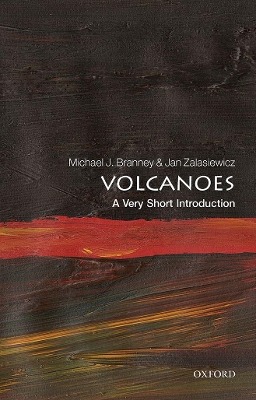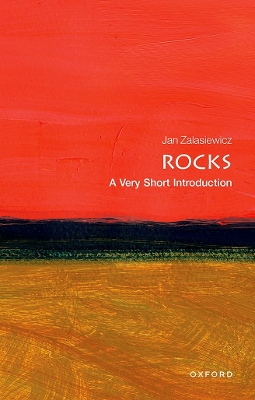Very Short Introductions
3 total works
Ranging across the 4.6 billion year history of the planet, geology is the subject that encompasses almost all that we see around us, in one way or another, and also much that we cannot see, beneath our feet, and on other planets. The fruits of geology provide most of the materials that give us shelter, and most of the energy that drives our modern lives. Within the study of geology lie some of the clues to the extraordinary impact our species is going to play out on the planet, in centuries and millennia to come.
In this Very Short Introduction Jan Zalasiewicz gives a brief introduction to the fascinating field of geology. Describing how the science developed from its early beginnings, he looks at some of the key discoveries that have transformed it, before delving into its various subfields, such as sedimentology, tectonics, and stratigraphy. Analysing the geological foundations of the Earth, Zalasiewicz explains the interlocking studies of tectonics, geophysics, and igneous and metamorphic petrology and geochemistry; and describes how rocks are dated by radiometric dating. Considering the role and importance of geology in the finding and exploitation of resources (including fracking), he also discusses its place in environmental issues, such as foundations for urban structures and sites for landfill, and in tackling issues associated with climate change. Zalasiewicz concludes by discussing the exciting future and frontiers of the field, such as the exploration of the geology of Mars.
ABOUT THE SERIES: The Very Short Introductions series from Oxford University Press contains hundreds of titles in almost every subject area. These pocket-sized books are the perfect way to get ahead in a new subject quickly. Our expert authors combine facts, analysis, perspective, new ideas, and enthusiasm to make interesting and challenging topics highly readable.
In this Very Short Introduction Jan Zalasiewicz gives a brief introduction to the fascinating field of geology. Describing how the science developed from its early beginnings, he looks at some of the key discoveries that have transformed it, before delving into its various subfields, such as sedimentology, tectonics, and stratigraphy. Analysing the geological foundations of the Earth, Zalasiewicz explains the interlocking studies of tectonics, geophysics, and igneous and metamorphic petrology and geochemistry; and describes how rocks are dated by radiometric dating. Considering the role and importance of geology in the finding and exploitation of resources (including fracking), he also discusses its place in environmental issues, such as foundations for urban structures and sites for landfill, and in tackling issues associated with climate change. Zalasiewicz concludes by discussing the exciting future and frontiers of the field, such as the exploration of the geology of Mars.
ABOUT THE SERIES: The Very Short Introductions series from Oxford University Press contains hundreds of titles in almost every subject area. These pocket-sized books are the perfect way to get ahead in a new subject quickly. Our expert authors combine facts, analysis, perspective, new ideas, and enthusiasm to make interesting and challenging topics highly readable.
Volcanoes are some of the most dramatic expressions of the powerful tectonic forces at work in the Earth beneath our feet. But volcanism, a profoundly important feature of Earth, and indeed of other planets and moons too, encompasses much more than just volcanoes themselves. On a planetary scale, volcanism is an indispensable heat release mechanism, which on Earth allows the conditions for life. IIt releases gases into the atmosphere and produces enormous volumes of rock, and spectacular landscapes - landscapes which, during major eruptions, can be completely reshaped in a matter of hours. Through geological time volcanism has shaped both climate and biological evolution, and volcanoes can affect human life, too, for both good and ill. Yet, even after much study, some of the fundamental aspects of volcanicity remain mysterious.
This Very Short Introduction takes the readers into the inferno of a racing pyroclastic current, and the heart of a moving lava flow, as understood through the latest scientific research. Exploring how volcanologists forensically decipher how volcanoes work, Michael Branney and Jan Zalasiewicz explain what we do (and don't) understood about the fundamental mechanisms of volcanism, and consider how volcanoes interact with other physical processes on the Earth, with life, and with human society.
ABOUT THE SERIES: The Very Short Introductions series from Oxford University Press contains hundreds of titles in almost every subject area. These pocket-sized books are the perfect way to get ahead in a new subject quickly. Our expert authors combine facts, analysis, perspective, new ideas, and enthusiasm to make interesting and challenging topics highly readable.
This Very Short Introduction takes the readers into the inferno of a racing pyroclastic current, and the heart of a moving lava flow, as understood through the latest scientific research. Exploring how volcanologists forensically decipher how volcanoes work, Michael Branney and Jan Zalasiewicz explain what we do (and don't) understood about the fundamental mechanisms of volcanism, and consider how volcanoes interact with other physical processes on the Earth, with life, and with human society.
ABOUT THE SERIES: The Very Short Introductions series from Oxford University Press contains hundreds of titles in almost every subject area. These pocket-sized books are the perfect way to get ahead in a new subject quickly. Our expert authors combine facts, analysis, perspective, new ideas, and enthusiasm to make interesting and challenging topics highly readable.
Rocks, more than anything else, underpin our lives. They make up the solid structure of the Earth and of other rocky planets, and are present at the cores of gas giant planets. We live on the rocky surface of the planet, grow our food on weathered debris derived from rocks, and we obtain nearly all of the raw materials with which we found our civilization from rocks. From the Earth's crust to building bricks, rocks contain our sense of planetary history, and are a guide to our future.
In this Very Short Introduction Jan Zalasiewicz looks at the nature and variety of rocks, and the processes by which they are formed. Starting from the origin of rocks and their key role in the formation of the Earth, he considers what we know about the deep rocks of the mantle and core, and what rocks can tell us about the evolution of the Earth, and looks at those found in outer space and on other planets.
ABOUT THE SERIES: The Very Short Introductions series from Oxford University Press contains hundreds of titles in almost every subject area. These pocket-sized books are the perfect way to get ahead in a new subject quickly. Our expert authors combine facts, analysis, perspective, new ideas, and enthusiasm to make interesting and challenging topics highly readable.
In this Very Short Introduction Jan Zalasiewicz looks at the nature and variety of rocks, and the processes by which they are formed. Starting from the origin of rocks and their key role in the formation of the Earth, he considers what we know about the deep rocks of the mantle and core, and what rocks can tell us about the evolution of the Earth, and looks at those found in outer space and on other planets.
ABOUT THE SERIES: The Very Short Introductions series from Oxford University Press contains hundreds of titles in almost every subject area. These pocket-sized books are the perfect way to get ahead in a new subject quickly. Our expert authors combine facts, analysis, perspective, new ideas, and enthusiasm to make interesting and challenging topics highly readable.


